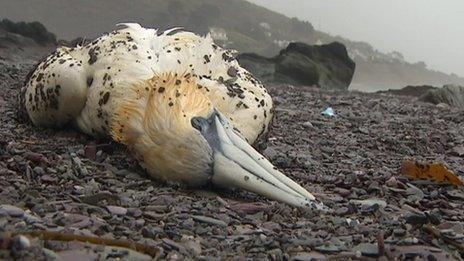PIB chemical pollution kills more birds than MSC Napoli
- Published

Nearly 3,000 birds have been killed or injured by the chemical polyisobutene (PIB) off the south and south-west coast this year.
The RSPB, RSPCA and local wildlife charities described it as "one of the worst UK marine pollution incidents".
About 20 species have washed up covered in the substance on beaches in Devon, Cornwall and Dorset since February.
The RSPB said the death toll has exceeded the number affected by the MSC Napoli beaching off Devon in 2007.
'Inexcusable and unacceptable'
PIB, a lubricant used to improve engine performance, can be legally discharged when ships wash out their tanks.
Wildlife charities want international action to stop the chemical, which does not break up easily, being discharged into the sea.
Last month transport minister Stephen Hammond said discharges by chemical tankers were being investigated by the UK and other European countries and the results would be passed to the International Maritime Organisation (IMO).
A statement issued by the RSPCA, RSPB, Devon, Cornwall and Dorset Wildlife Trusts and the British Trust for Ornithology (BTO), said 2,400 birds had died and more than 500 live but "disabled" birds had been rescued and taken for treatment.
It said PIB becomes strongly adhesive in the sea, coating the birds and restricting their movements and their ability to feed.
The RSPB's Tony Whitehead said; "This is one of the worst marine pollution incidents in decades, bringing to mind other disasters going right back to the Torrey Canyon in 1967."
He said it was a wake-up call "to give proper protection to our precious sea life".
Adam Grogan, from the RSPCA, said the first incident in February was heartbreaking, but for it to happen twice was "inexcusable and unacceptable".
Post-mortem tests have been carried out on hundreds of the dead birds by the BTO and the results are due to be published within the next few weeks.
"The timing of this incident will have contributed to the large number of casualties...but where this impact will be most noticeable isn't yet known," BTO spokesman Mark Grantham said.
The charities have urged members of the public to sign petitions by Avaaz and 38 Degrees to support their call for a ban of dumping chemicals at sea.
- Published19 April 2013
- Published19 April 2013
- Published17 April 2013
- Published16 April 2013
- Published15 April 2013
- Published15 April 2013
- Published8 February 2013
- Published9 February 2013